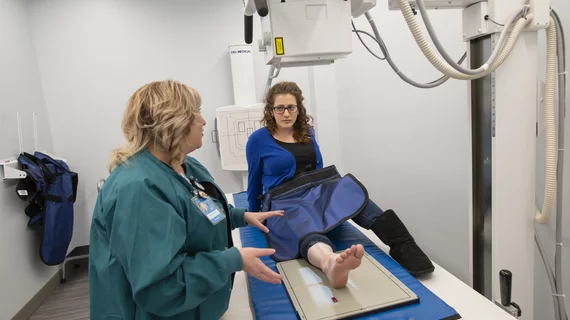Walmart’s experiment offering imaging at its superstores fails as retailer closes all clinics
Walmart’s experiment offering imaging at its superstores has failed as the retailer plans to close all clinic locations, leaders announced Tuesday.
The company had touted ambitious plans one year ago, hoping to double the size of Walmart Health, rolling out “state of the art” centers with X-ray machines, Epic electronic health record integration and other services.
However, the Bentonville, Arkansas, company is now admitting defeat and will end the experiment five years after it started.
“The decision to close all 51 health centers across five states and shut down the virtual care offering was not easy,” Walmart said April 30. “We understand this change affects lives—the patients who receive care, the associates and providers who deliver care, and the communities who supported us along the way. This is a difficult decision, and like others, the challenging reimbursement environment and escalating operating costs create a lack of profitability that make the care business unsustainable for us at this time.”
Walmart—which has 4,600-plus stores in the U.S.—first launched the effort in 2019, hoping to further capitalize on the millions of visits its logs each year. Each Walmart Health outpost was about 5,750 square feet and also delivered primary care, EKG, labs, behavioral health and other services, with physicians and community health workers on the payroll. However, the company is now admitting Walmart Health “is not a sustainable business model for us to continue.”
The company could not say when each center will close “but will share as soon as decisions are made.” Walmart plans to use the lessons learned from the brand and apply them through its nearly 4,600 pharmacies and 3,000-plus vision centers. Walmart also partnered with imaging industry giant RadNet in December to add mammography services at three locations. This pilot will not be impacted by the decision to shutter Walmart Health, RadNet confirmed.
“Our culture of innovating and trying new formats and services has helped our company become stronger and better able to serve customers,” Walmart said in a statement.
Provider partners will continue serving existing patients while the clinics remain open. Through their respective hospital employers, they’ll be paid for 90 days, Walmart noted.
Physician and blogger James V. O'leary, MD, (@RealDocSpeaks) commented on the news on Tuesday.
“It is very difficult to operate profitable primary care clinics. They are low-margin, and the patients take a lot of time and resources if you operate them well,” wrote the OB/GYN specialist. “Corporate entities should not own medical practices or health centers. Primary care physicians are the unsung heroes of the healthcare world. They are underpaid and overworked. Large corporations think they can do a better job and continue to fail at it.”
Radiologist Nisha Mehta, MD, founder of Physician Side Gigs, also commented on the news in a social media post shared Tuesday.
"As a physician, it’s been fascinating to watch over the past few years as so many non-medical companies try to get their bite of the huge percentage of the GDP that is healthcare," she wrote. "They pour money into trying to deliver healthcare at scale, ignoring the many concerns that hospital systems and physician private practices have been citing for years: declining reimbursements, shortages of clinicians, and expensive labor costs. Healthcare is broken, and those that are in it understand why."
Each week, about 255 million customers and members visit Walmart’s 10,500 stores spanning 19 countries worldwide. The company recorded fiscal year 2024 revenue of $648 billion and employs approximately 2.1 million associates. Shuttering Walmart Health clinics were in Arkansas, Florida, Georgia, Illinois and Texas.
Other mega retailers have faced recent primary care failures similar to Walmart. Walgreens just announced the closure of 160 VillageMD Clinics after recording a $6 billion loss.

